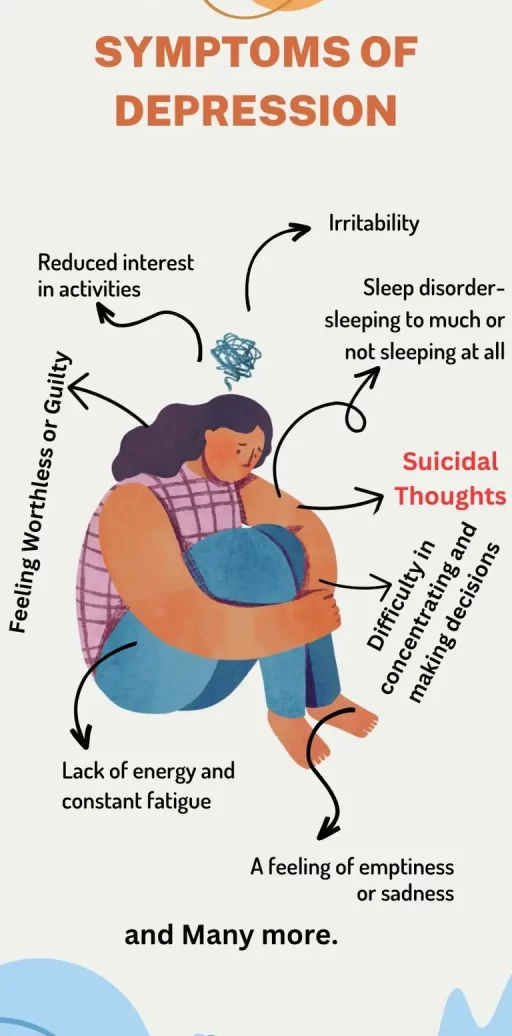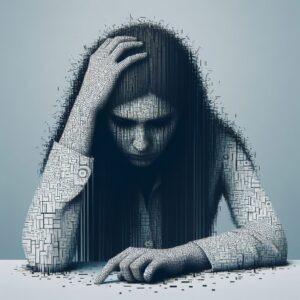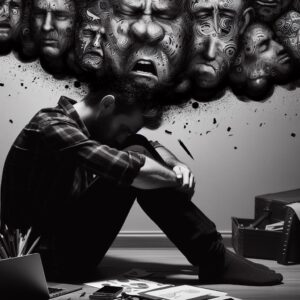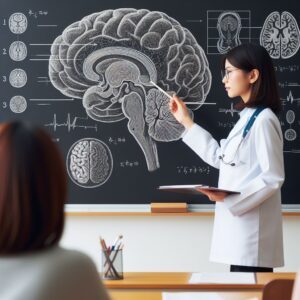To all who are not in Depression.
Imagine losing every single glimmer of hope in your life. Life in itself starts feeling like a burden. Every single second gets heavy with you being under the buttocks of a giant elephant-sized burden that you cannot figure out where it is coming from. Breathing peace is just like breathing air underwater. Forget about making sense, as being logical is an elusive luxury in this state. Persistently being sad, losing any interest in pleasure, sleep patterns becoming patternless, and your appetite dissolving into mere fragments is a feeble attempt to define the essence and soul of depressed people loosely.
At full fruition, depression feels like dancing at an edge between death and life. At the breathing end of the dance arena are a few hands of love, a burden of responsibilities, and a life full of humongous struggles and puny victories. When expectations seem too tough to fulfil, the death side against all this seems like ‘Freedom‘.
What is it ?
Symptoms

What goes on in a depressed Mind?
1. Dismissals – People when going through a mental battle try to ignore their battle. While contemplating their emotions, they dismiss any pain. They would compare their problems with those of others and end up saying people are enduring far worse than what’s bothering them. Whereas, everyone feels differently. The degree of emotional effect of something on one person is different from that on another.
2. MATHS – In everyday life, one might have most probably experienced the Blessings Count suggestion at least once in life. When we try to contemplate our problems or even share them with someone, this always comes up. “Try to count the good things in your life rather than focusing on one bad thing, ” which is a positive approach but also a little silly.
For instance, imagine a scenario, where a person is anxious and in pain because they got the news that they are suffering from lung cancer. We cannot make them feel better by saying, you should count the other 10 types of cancer that you do not have or cannot point towards the other 10 healthy properly functioning parts of the body. 
3. Motivation to Suicide – In the world of a depressed person, their insecurities get heightened. They start to hate every small detail they feel is not up to mark in their personality or physicality according to their self-created standards. It goes like this, “I am not tall enough, I am not fair enough, I do not have hair of silk – Who will love me? I would not have loved myself if I was someone else.”
I cannot speak English, I do not know how to use the computer, I do not know that software, I cannot speak in front of 10 people. I deserve to be unemployed. Who will hire me? Myself, would not hire me.”
“My friend has started earning $5000 a month, I do not even have a job. I am 25 and jobless. I am no help to my parents. I do not even have a girlfriend. No girl would ever love me. Everyone laughs at me. Surely, they do at my back. I should die, I am of no use to the world.”. Such is the negativity of overthinking and self-loathing when in depression which is entirely wrong.
4. Continuous War – The patient is always in fear of losing their sanity. They are anxious about being anxious. There is a constant fight between the want to be sane and not being dragged toward the label of insanity. A war is on for just the feeling of feeling fine. Every day the patient at the end of the day loses the war and falls asleep because that’s the only way to stop the war of thoughts. There is a continuous War to keep oneself Alive when depression is in its Prime.
Why do people hide depression?
There is one superpower that people develop when going through depression. The power of hiding it well. Concealing certain feelings and emotions even from friends, family and even their therapist is an art of the pain that they are in.
We are living in a world where expressing oneself is a lot more difficult than hiding our realities. Depression falls under a category of mental illness and is usually concealed for many reasons. The major Coping Mechanisms are –
1. Weakness – A person struggling with depression hides it from the world because of society’s age-old upbringing. It’s a pervasive perception of society that any person dealing with a physical or mental problem is seen with the gaze of pity and sorrow. Nobody wants to be perceived as a diseased part of society which is ineffective in well well-functioning dynamics of the societal system. So, hiding one’s pain becomes a Defence Mechanism.
2. Society’s Reaction – The story doesn’t just stop on gazes or merely how the people would perceive the person. The reality unfolds in rude comments, negative critiques, and judgments directed toward one’s personality and reasons for her/his depression. Now, this for someone grappling with depression is extremely arduous to bear and also unfair. All this adds up to the grip of depression slowly and steadily cutting the oxygen to the brain.
3. Professional Setback – Depressed people might become victims of a misconception as incapable of performing in professional environments. This steals a big chunk of a person’s confidence which further deteriorates her/his mental health. Thus exacerbating their mental health battle. So, one factor is just to save oneself from all the above, one might choose not to share about her/his mental health.
4. Indescribable – Most of the time. Feeling what they are going through is just indescribable. How would you tell someone about depression? The synonyms for depression are sadness, despair, pain, confusion, indecisiveness, gloominess, melancholy, dispiritedness etcetera etcetera etcetera. The depressed individual just is unable to find the correct words and person to talk about it. “The major issues are, ‘Whom to talk to’ and ‘How to explain what they are going through?'”
5. Lack of faith in people – As articulating one’s feelings is a challenge, so is trusting someone. It is a common saying that no one can understand someone’s pain until and unless you step into their shoes. Hesitation always stems from the thought that will the listener genuinely listen or comprehend with an open mind.
We all have secrets and it takes a lot of courage to open up with someone. Showing your naked emotional self to someone despite the person being your family or best friend takes a humongous leap of faith. Past negative experiences of unsupportive reactions or broken trust also make it difficult to tell someone that they are not OK.
6. Shame – We all harbour our share of secrets. Some are big and some are trivial, safeguarding aspects of ourselves from the eyes of the cruel world. But once depression hits, a person’s every insecurity gets heightened. Yes, there is the small realization that the person needs to share in such time but letting someone know their once safely hidden secrets is. It is just breaking so many boundaries and letting people have a chance to judge us on multiple levels.
To spare oneself from the burden of a lifetime of shame in front of friends and family, one opts for silence. They choose to go through unbearable pain every second they breathe. All thanks to not so judgemental society of ours (This one is sarcasm).
What is not told about depression
If you are knowledgeable to the level that you need to encounter overtly negative or discreetly traumatic experiences to fall into depression then you are half-ass cheek knowledgeable. You need the other ass cheek to fulfil your depression-related basic education.
The Ultimate reason for depression -
Falling into the dark pit of depression does not necessitate enduring some trauma or significant personal loss. An individual enjoying optimum physical health, thriving in their careers, and in a perfect relationship can go into depression.
Depression is not always heightened sadness, sometimes it is the deficiency in emotions such as joy, excitement, and hope.
We need to hammer the above in our minds.
Depression is not always heightened sadness, sometimes it is the deficiency in emotions such as joy, excitement, and hope.
We need to hammer the above in our minds.
Biological Reasons
1. Genetics – Family, twin and adoption studies have shown depression runs in the family, which can also be one of the reasons. This can be in identical twins also – if one has depression then the other is also susceptible to having depression. There is no particular gene that is responsible for depression but there are multiple genes in the genealogy pool which can become reasons for depression.
2. Pregnancy – This type of depression is called Postnatal Depression. A mother after pregnancy goes through multiple hormonal and physical changes in her body which can lead to Postpartum Depression. Sometimes the depression might even start showing symptoms before birth which is called Antepartum Depression.
3. Menopause – Menopause is one phase in a female’s life when the periods stop. From here on the woman’s body goes through multiple hormonal changes. The individual might experience sadness or erratic mood swings during this phase of life. This can also lead to depression.
5. Chronic or Prolonged Illness – Sometimes we are unable to find a solution to an illness. Such illness breaks a person’s morale every day bit by bit. Diseases like cancer, hypothyroidism, or coronary heart disease are some examples. Even problems like baldness can cause a lot of anxiety and depression.
Society Induced Reasons
1. Low self-esteem – Some people get affected by little things at a deeper level that relatively others just ignore. So your personality or how you take on life can also be one of the reasons. Also, major issues in personal life like divorce, low social support and marital problems can be the reasons.
2. Environmental Factors – Being in the vicinity of neglecting caregivers, abuse – mental or physical, stressful events, poverty, sexual abuse – especially in childhood etcetera can also lead a person to depression.
3. Isolation – Experiencing loneliness, resulting from situations when an individual has to stay away from their family and friends can also increase the risk of depression.
4. Alcohol and Drugs – When life throws pain or challenges on one, that breaks them every day, sometimes an individual chooses drugs or alcohol to soothe the pain. Yes, drugs and alcohol help alleviate some pain but these adversely affect the chemistry of the brain which may lead to depression.
5. Gender-Specific – Men tend to experience depression during or after a divorce, separation from a lover, or work-related problems whereas women are more prone to depression when experiencing problems in their immediate social circle, severe illness or DEATH. (https://www.ncbi.nlm.nih.gov/pmc/articles/PMC2950973/)
Whats going on in the brain?
Our brain functions with the help of multiple neurotransmitters that help carry signals from one neuron to other cells which can be a nerve cell, muscle cell or gland.
Neuroscientists today have researched a lot to understand depression. For this, they have performed hundreds of functional MRIs, used genetic biomarkers, done multiple post-mortem studies by dissecting the brains of deceased people suffering from depression, and looked at the brains of mice experiencing depression. depression is linked with abnormal connections between the neurons.
Neuroplasticity also called neural plasticity or brain plasticity is the ability of our brain to reorganize or adapt to any trauma or physical injury to the brain. Neural circuits are bound to break and reorganize following an unwelcome event in our brains. In a scenario when neurons are unable to organize themselves in circuits that can fire together and relay the message to the next cell in our brain, there is failed transmission of chemicals. 
Circuit links are broken in such scenarios. Loss of such synaptic connections causes noisy communication in our brain cells. This is negative neuroplasticity. There is no evidence as to what makes all this happen in the brain.
Negative neuroplasticity leads to an inadequate amount of neurotransmitters in our brain. Previously, uneven supply of major hormones like serotonin, norepinephrine and dopamine were assumed to be the main players in depression cases.
But, new studies show that this was a limited hypothesis. Our brains are supplied with more than 100 neurotransmitters helping in billions of connections in our brain. Out of these neurotransmitters multiple could be responsible for depression.
The research results say that abnormal neural connections in our brains aid in depression.
All this is just a consequence of depression and not the cause.
The causes of depression are both internal and external factors. Every case of depression happens to be unique having its own set of factors leading to chaos in an individual’s mental health.
What to do when in depression
Do not try to self-diagnose yourself as a Depression Patient based on this blog or any other resource from the internet.
Consult a Psychiatrist or a Psychologist. If none is available, visit your General Practitioner for help.
1. Mindfulness – Meditation and mindfulness have been proved by many studies to be effective in mental issues. According to Dr. Margaret Rutherford, mindfulness helps increase neuroplasticity. When you consciously choose to think about the present, the brain functions start to get better. When you consciously do not allow your mind to wander, you consciously are choosing to heal. That’s being mindful. In the long run, it helps with sustained connectivity or neural networks and improvement in your depression
2. Therapy– Consulting a psychiatrist or psychologist does not mean one is insane and mentally unfit to function. Visiting a psychiatrist or psychologist and signing up for therapy sessions has worked wonders for people with depression.
The two most common therapy methods when dealing with depression are –
– Cognitive Behavioural Therapy – Here, the patients learn to manage and control their negative thought processes. How to identify and manage negative thought patterns. Avoiding pessimistic thought processes that might lead to depression or break the negative beliefs that we set for ourselves. Even, seeing life and interacting with other people positively is a part of it.
– Interpersonal Therapy – In this form of therapy patients are made to improve their relationships by learning to express better and deal with situations in a healthier manner. To cope with depression symptoms patients are helped to sort out their interpersonal issues that may be causing stress and anxiety that worsens their depression.
In therapy, every individual will have a case-specific tailored approach to help the individual come out of depression. Have faith in your therapist who spent a decade studying to help you come out of emotional darkness.
3. Medications – There are multiple antidepressant medications developed to alleviate your pain when dealing with depression. The major categories of medications are SSRIs (Selective Serotonin Reuptake Inhibitors), SNRIs (Selective Serotonin and Norepinephrine Reuptake Inhibitors), Atypical Antidepressants, Atypical Antidepressants, Tricyclic Antidepressants, Monoamine Oxidase Inhibitors (MAOIs) and also Combination of Antidepressants.
Your physician would prescribe medicine according to your particular case. Depression is a long-term disorder, not something that can be turned off instantly. The journey of recovery is steady but 100% possible. Hope is what you need to not lose.
Conclusion
There have been great poets in the world and some wrote about pain to an extent that some of us might not even have touched the grain of. Some decades ago there weren’t even any effective treatments for depression and victims of depression would have to go through a life full of depression till the end fighting every second and winning at life in the realm of words but losing in the realm of life – a joyous and peaceful life.
Sylvia Plath was one of the prominent writers in the world of poetry but took her own life in the hands of her writing rejections and her partner’s cheating. Some of her quotes full of pain were –
“It is so safer not to feel, Not to let the world touch me”.
Sylvia Plath
“The silence depresses me. It wasn’t the silence of silence. It was my own silence.
Sylvia Plath
She was screaming through her words to save her. She was still there but was in pain. People do not give up on hope in the black holes of depression. “Always in search of the next thing that will heal me. I want to feel like myself again.” There is always this search and wait in the mind, for the very second when they would feel like themselves and be happy again. 
Anyone dealing with anxiety, stress, or the worst Depression, please do not let go of hope. Yes, it is our society’s fault that we were never taught how to express those difficult feelings. So subconsciously we thought they were something to be kept under the sheets. Yes, there is a beautiful world that is waiting for you. Just the condition is, you need to stand up for yourself and call for help. Those doors shall open, passing glimmers from the light of healing and once you have crossed and healed yourself, you will be the healer. Any remnants of depression would be reduced to shards on the ground
What can we the ones not in depression do? – Listen and Call the Doc. (Keep Your judgement in your pockets)
Links
Share this post: on Twitter on Facebook

Blog Review
Good parts
Loved the indepth understanding of depression as an academic discussion
The real factors part was really good
Overall language was very simplistic compared to previous blogs
Good use of quotes, diagrams, famous personalities
Scope for improvement
Could have used more real life examples of people who have successfully beaten depression
Could have talked more about solutions to depressions. This part came in very late and was less in the overall balance of the blog.
We appreciate your review, sir. Your insight helps us get better and better in our journey to success. 😀